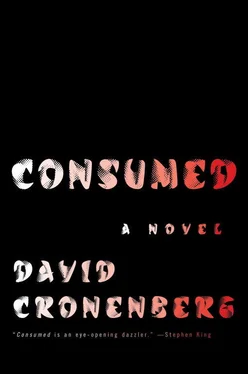Célestine was horrified and transfixed by these scenes, even as she was, in a sense, creating them; she clutched her left breast as she watched them (her larger breast, and my favorite, even though it was less perfectly shaped than her right; it was not just the size, it was the nipple, the areola, the elastic softness, the birthmark like the one on Elizabeth Taylor’s cheek). For her, the message from Romme, the love letter’s message, was: Cut off your left breast, that rustling bag of insects, because if you don’t, those insects will spread their insect religion to your entire body, including, and especially, your brain. And then you will be done as a philosopher, and you will be of no use to Romme Vertegaal.
I soon saw this as Célestine’s version of what we called apo, for apotemnophilia, though I was aware that it seemed not really to conform to the template of the syndrome. That template involved the desire for an amputation of one or more limbs as a correction to a body whose structure was not yet correct. My right leg does not belong to me, it is an extraneous appendage. I need it to be gone; I cannot be whole, I cannot realize myself, until it is gone. At my insistence, Célestine and I studied apo assiduously, because I could not accept her certainty that she had received a diagnosis from an old lover through the medium of a movie which mysteriously conveyed both a prognosis and a drastic course of treatment, all of which seemed accurate and acceptable to her.
Célestine indulged me in my desire to convince her that she was suffering from apotemnophilia, which, though exotic enough, was at least an acknowledged psychic construct supported by a body of technical medical literature and many websites of the afflicted. Research was ongoing. Discoveries involving skin conductance response experiments followed up by magnetoencephalography seemed to confirm the neurological basis of the syndrome; it could be argued that it was not in her neurotic imagining but was corporeal, a brain problem, and therefore “real.” But the Célestine version of apo was perhaps too exotic even for this structure. She gently pointed out to me, as in a casual, sweet discussion (the devastating technique she used with her students which made them love her), that she had had no breasts in childhood and therefore had not as a child wanted them amputated; that a desire for breast reduction or even mastectomy was not a recognized part of the apo syndrome, but related more to gender change/confusion and other psychic states, and that it was not so much that her left breast felt as though it were not part of her body as that it was full of insects that were a danger to her, like ductal carcinoma in situ or full-blown breast cancer, and therefore the removal of that breast was calmly, rationally indicated.
And the element of religion was also far from a classic apo concern. Célestine’s book The Nipple and the Mouth , about the universal religion of the nourishing breast, was of course the critical text here. It delineated how a pure, rigorous atheism required the rejection of some religions that were not recognized as religions but functioned as religions and thus needed to be exposed and dismantled—like the insect religion of Judicious as communicated to Célestine by her former Dutch-born French lover, Romme, now transmuted by the alchemy of kidnapping into a North Korean movie director. You see, then, what I was faced with on that waking from a dream, the dream that had been our life together up until that moment in the early morning in that villa high above Cannes. And so my unspoken struggle with Célestine was to be conducted on two fronts: her desire to amputate her left breast, and her desire to reconnect with the phantasm of Romme Vertegaal, aka Jo Woon Gyu.
Had she actually had a stroke, a cerebrovascular accident, while we watched Judicious in the jury box in Cannes? Had the stroke clouded her brain with cosmic portent while the images of peasants, warrior priests, and insect harvests flowed over us? (I thought of Philip K. Dick’s post-stroke religious novel The Divine Invasion. ) By the time we had got back to Paris, she was joking about our experience during the festival and suggesting that her little “philosospasm” had been caused by the overheated and overly critical public atmosphere of the festival itself. And did she have another stroke during the night which reanimated the power of the movie over her after it had lain dormant for several months? Could a stroke regenerate the effects of a prior stroke, effects which had flared and then shriveled away to nothing? I urged her to book a CT scan. I scanned her face myself, looking for telltale weakness, a slumping mouth, a drooping eye. I found nothing, and she felt nothing, and refused to see a doctor of any kind. It was a simple series of epiphanies, she said, the kind we often suffered together— suffered because they struck us as revelations that demanded action, that upset comfort, turned it over and dumped it on the polished hardwood floor. She was talking about philosophical and social awarenesses, breakthroughs of cognition which were inextricably mixed with potent emotional mandates. We would often force these moments into being while traveling when exhausted, or when writing while under extreme political duress. I could not deny the reality of these intangible and cryptogenic events; we had shared so many. Intellectually, for a nanosecond, it all seemed reasonable, and then it all seemed patently foolish and insane: amputate a perfectly healthy breast because, against all plausibility, its owner disowned it and feared its contents?
I insisted that Célestine let me study the results of her last mammogram. She did not resist. Its affirmed normality (with the usual technicians’ disclaimers regarding the unusual density of her fibroglandular tissue seen bilaterally, which decreased the sensitivity of the mammography and thus possibly compromised an accurate assessment) did not faze Célestine. It was three years old, and so it contained the seeds of its own inadequacy; it represented a flawed and circumspect medical worldview which could not and did not address the plane of existence upon which human life is conducted. There had been ultrasounds, pictures of the inside of her breasts. We strolled through them as though they were old family photos. There were no insects in evidence. Of course not, she said. The onset of the insects is abrupt, barbaric, and absolute. It is a colonization, as per the village in Judicious , a first staging, to be followed by a total metastasis and subsequent subjugation. How did they get in there, into that beautifully sealed liquid dome? “They can burrow. They can tunnel. They can inject eggs. I’ll be meeting with my entomologist Korean friends about it,” she said. “We’ve already made a date to discuss global insect strategies.”
“I’d like to be at that meeting. I’d like to document this… adventure.”
“You can, of course you can. And you can do more than that. You can meet with your audiologist and see if she’ll tell you where Romme is living right now. She will have been in contact with him, I’m sure. They had a special relationship, very complex and subtle, and his hearing—and so also his career as a filmmaker—in some ways depended on her. He won’t have abandoned her, even at the distance between Pyongyang and Paris. I think now they can even reprogram your hearing aids for you over the internet. After all, they’re just tiny Bluetooth-and-Wi-Fi-enabled little computers. I think you’ve even done it yourself, haven’t you?”
I hadn’t, but I had no doubt that it was possible. And I had no doubt that if anyone was programming the Dear Respected Leader’s favorite movie director’s hearing aids over the internet from an office in Paris, it would be Elke Jungebluth.
Читать дальше
Конец ознакомительного отрывка
Купить книгу







![David Jagusson - Fesselspiele mit Meister David [Hardcore BDSM]](/books/486693/david-jagusson-fesselspiele-mit-meister-david-har-thumb.webp)




